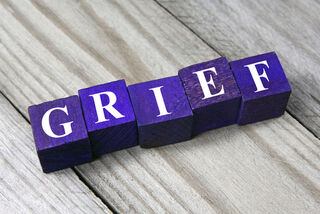Grief
How Grief Can Exacerbate Eating Disorders During a Pandemic
Grief related to pandemic losses can trigger binge and emotional eating.
Posted February 3, 2021 Reviewed by Jessica Schrader

The COVID-19 pandemic has turned our lives upside down and has caused an increase in depression, anxiety, substance use disorders, and eating disorders. It has been difficult and stressful to manage having to stay home and be socially distant from others. It is especially difficult if you have experienced losses during the pandemic.
Grief is a normal reaction to any major loss. We have rituals for grieving that help us get support and feel a sense of completion around the loss of a loved one. All of that has changed during the pandemic. If you've lost a loved one during the pandemic, you may have experienced complicated grief. The normal feelings of yearning and sadness may have been complicated by not being able to be with your loved one or not even being able to go through normal rituals that can bring a sense of comfort and closure. So many of us have had to grieve alone.
This can lead to a new disorder called "prolonged grief disorder" (PGD), which is described in a recent article as "core symptoms such as longing for and preoccupation with the deceased, along with emotional distress and significant functional impairment that persist beyond half a year after the loss of a significant other." The six months for grieving has not been established in research as a clear marker that separates normal grieving from PGD. Cultural traditions also play a big part in the time length of the mourning period as well as normal human variations in reaction to loss.
Prolonged unresolved grief has an impact on heart health and also on the immune system and can lead to anxiety, depression, substance use, and post-traumatic stress disorder. During the pandemic, the lack of the usual rituals and supports may make it even more difficult to recover from the loss of a loved one. Burnout among health care workers is at an all-time high. Over half of women who have had to home school their children during the quarantine report worry and stress due to COVID-19. Existing mental illness in adolescents may be exacerbated by isolation and loneliness, and substance use and other risky behaviors are up in this population.
Grief can occur in response to many other types of losses. There are many other losses that have occurred during the COVID-19 pandemic. Maybe you've experienced the loss of a job, the breakup of a significant relationship, loss of a long-term friendship, financial losses or you've been diagnosed with a serious illness (including COVID-19). All of these losses can also be a cause for grieving. Over 50% of Americans say their mental health has been impacted by the pandemic and more than 10% have reported an increase in alcohol or substance use or a worsening of preexisting health conditions. Others report trouble sleeping, problems with focus or concentration, and fear and worry about finances.
Focusing on food and body image can be a distraction from the grief process. In the beginning, after a loss, you may experience a loss of appetite in response to the chaos and the loss of control, uncertainty, and sadness you're feeling. Restricting or controlling your food can serve as a way to numb yourself from these raw feelings. But this is a false sense of control. The pain you're feeling won't go away unless you meet it head-on. Emotions can't be fixed by food or by obsessing about your body.
If you find yourself feeling compelled to go on a diet, restricting your food, binge eating, isolating more to avoid any activities that involve food, this is a sign that you may be using food to self-medicate the pain of your loss, and as you've heard me talk about, this only causes more problems.
My own experience with grief and loss has taught me a lot. The death of my son at the age of 29 was one of those experiences which I wrote about in a Psychology Today blog post some time ago. Reading about the death of two of President Biden's children reminded me of how many of us have lost children and how painful the experience can be. My son Noah's death almost broke my spirit. Even nine years ago when I wrote the post, there were times when my grief was still surprisingly raw. I recently had a dream about him that felt so real and the longing for him was still as strong as the day he died.
Several years ago, my brother who was only 13 months younger than me, died after a long struggle with addiction and its medical consequences. At his death, I was surprised at the depth of pain and the sense of loss I felt at not having him in my life. I began to speak about his life as a way to honor him, which I did in my TEDxPleasantGrove talk last year.
Everyone's experience of grief is unique; there is no "right" way to grieve. As you can see, I tend to speak and write about my experiences with grief and this helps me to cope with the pain. Using food to cope with loss is not uncommon. After 9/11, studies showed a marked increase in emotional eating of "comfort foods." But using food provides only temporary relief and doesn't address the central issue: the need to grieve a loss.
I could tell you about the five stages of grief or I can give you "coping tips and strategies," but what I've learned from my own experience with grief is:
- It's always surprising how much it hurts. It's no wonder we want to find comfort wherever we can because loss and grief really hurt. It feels like a kick in the chest, a punch in the gut and you may feel as if you can't handle it.
- Even when a loss feels overwhelming, we are all much stronger than we think. If you allow yourself to feel whatever emotions you have—sadness, anxiety, anger, etc.—even if you do it a little bit at a time, the pain will lessen. Pushing down the pain with food only "feeds" the myth that you can't handle it.
- Don't let anyone tell you "you should be over it by now." We all grieve in different ways and for different time periods. If, however, you find that you are unable to take care of yourself, go to work, etc. after a reasonable period of time, you may be experiencing depression and you should reach out for help.
- Grief and loss don't just magically go away over time. Grief comes in pieces. At times all you feel may be gut-wrenching sadness, at other times you may feel regrets or longing. And it's not time that makes it better, it's you feeling your emotions that makes it better.
If you are struggling today, remember this; You have survived everything you’ve gone through up to this point. The best day of your life is still yet to come. There are still people you haven’t met, and things you haven’t experienced. You can do this. —Anonymous
No matter what type of loss you've experienced, it's important to take care of yourself. Eat regularly throughout the day so you can keep strong for the hard work of grieving. Spend some time in nature if you can. Reach out for support from friends or from a professional. As always, I advise that you be kind to yourself. Don't judge yourself for how you've reacted to the loss whatever that loss is.
References
Bryant RA, Kenny L, Joscelyne A, et al. Treating Prolonged Grief Disorder: A Randomized Clinical Trial. JAMA Psychiatry. 2014;71(12):1332–1339. doi:10.1001/jamapsychiatry.2014.1600
Killikelly C, Maercker A. Prolonged grief disorder for ICD-11: the primacy of clinical utility and international applicability. Eur J Psychotraumatol. 2018;8(Suppl 6):1476441. Published 2018 Jun 6. doi:10.1080/20008198.2018.1476441
https://www.kff.org/coronavirus-covid-19/issue-brief/the-implications-o…




